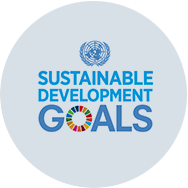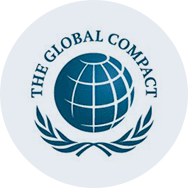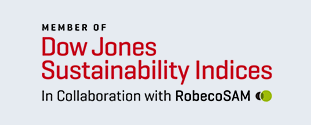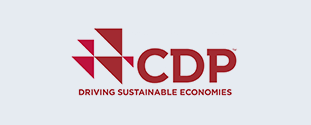Sustainability Management
KT is pursuing economic prosperity, social progress and environment preservation through its professional management
and creating an environment that is conducive to a sustainable future where businesses and societies enjoy mutual benefits.
-
Sustainability Leadership
Leading Global Sustainable Management
KT, as a globally responsible telecom company, is promoting sustainable management across the company to create a sustainable future for humanity as demonstrated by its international partnership with the UN Global Compact and implementation of the UN Sustainable Development Goals. KT’s innovative activities and performances in economic·environmental·social aspect have been highly praised by the world renowned sustainability assessment indexes such as DISI and CDP, which has established the company as a global telecom service provider.
Implementing UN Sustainable Development Goals

- MediaUN SDG
Secure quality of education - Smart EnergyUN SDG
Sustainable energies - Improve
Corporate·Public ValuesUN SDG
Infrastructure and industrialization - Financial
TransactionUN SDG
Economic growth and jobs - Disaster·SafetyUN SDG
Sustainable cities
UN Sustainable Development Goals are the UN’s 17 mid- to long-term development objectives to solve global economic·environmental·social issues during the period from 2016 to 2030. KT actively supports and participates in the UN Sustainable Development Goals of making life on Earth better by providing GiGA infrastructure and innovative technology·services. To realize the new UN sustainable plan, the company is committed to achieving those core objectives closely related to telecom business.
Officially Signing and Endorsing the UN Global Compact

- Human RightsRespect human rights, prevent human rights violations
- LaborGuarantee freedom of association, eliminate forced labor Abolish child labor, prohibit discrimination
- EnvironmentProtect environment, increase environmental responsibility, develop eco-friendly technologies
- Anti-corruptionOppose all types of corruption
KT joined the UN Global Compact, an international treaty on social responsibility in 2008 to take on the roles and responsibilities of a responsible corporate citizen. The company actively practices 10 principles in the 4 areas of human rights, labor, environment and anti-corruption and secured policy basis by establishing new ethical management principles, human rights policy, and environmental management policy. We are spreading the principles of UN Global Compact across the company and value chain and creating common social value.
Dow Jones Sustainability Indices (DJSI) Global Top-tier

- 2009Admitted to DJSI Asia-Pacific
(Initially) - 2010Admitted to DJSI World
(top 10% in world telecom industry) - 2013Selected as a DJSI Industry Leader for 3 consecutive years
(World No. 1 in telecom industry) - 2016Selected to DJSI Gold Class
(top 1% in world telecom industry)
KT joined the world renowned DJSI assessment in 2009, which evaluates internal and external sustainable management capabilities and promotes internal improvement. Since 2010 when KT was first selected to participate in DJSI World, the company has gained the best evaluation result every year through continuous system improvement and sustainable management. It was selected as the global no. 1 telecom company for 3 consecutive years from 2011 to 2013, which enhanced its position as an industry leader. DJSI is an investment index and assessment model developed by Dow Jones & Company, an American financial information and publishing firm, and RobecoSAM, a Swiss investment company, and evaluates the world’s top 2,500 market cap companies in terms of economic, environmental and social sustainability every year.
Awarded Honors Club in Carbon Disclosure Project (CDP)

- 2008Participated in CDP
(Initially) - 2013Initially awarded the carbon management honors club
(World No. 1 in telecom industry) - 2015Awarded the carbon management honors club for 3 consecutive years
(World No. 1 in telecom industry) - 2016Awarded the carbon management honors club for 4 consecutive years
(World No. 1 in telecom industry)
KT has promoted companywide environmental management based on environmental management policy and worked to make the telecom industry eco-friendly since 2008 by participating in the Carbon Disclosure Project (CDP) annually. CDP is the most-credible environmental management index for global companies which comprehensively assesses climate change response level, carbon management capabilities and carbon emissions. The company was selected as the No. 1 global telecom company with 100 points out of 100 scale in carbon disclosure for 2016, which recognized its effort to promote eco-friendly management and its outcome during the period.
- MediaUN SDG
-
Sustainability Management System
Sustainable Management Organization
The world faces the biggest challenge in human history due to the intertwining factors of global climate change, demographic changes, deep exhaustion of resources and technological development. KT has established a long-term sustainable management strategy to focus on developing innovative technologies and capabilities and improve sustainability for humanity and the world. To efficiently execute this strategy companywide, it was Korea’s first telecom company to install a ‘Sustainable Management Committee’ in the BOD in April 2016. In addition, the company newly installed the sustainable management unit, an executive organization to implement the strategy and ensure timely execution, and run it with consultations from the Sustainable Management Committee, an exclusive advisory body.
- Board of Directors
- BOD
- Sustainability Management CommitteeReport to BOD, BOD Review/Decidework of Sustainability Management Committee.
- Sustainable Management
Committee - Establish StrategyReport to Sustainability Management Committee, Sustainability Management Committee Review/Feedbackwork of Establish Strategy.
- Agencies
- ESG Council
- Working GroupESG Implementation
Department
- subcommittee
-
-
Environmental
Management Committee- Expand environment ICT
- Reduce environmental effects
- Cope with environmental regulations
-
Shared Growth
Committee- Mutual growth policies
- Conciliate supplier dispute
- Cope with regulations
-
Group Ethical
Management Committee- Manage sustainable management related pre-risks
-
Environmental
Stakeholder Engagement Process
A stakeholder means an individual or a group with an interest or concern in business directly or indirectly. KT has defined 8 major stakeholders in terms of business and function to efficiently communicate with them and reflect main issues in management activities while listening to their concerns and demands through various communication channels. Particularly, the company extended the scope of conventional stakeholder - customers, employees, suppliers and communities - to ‘environment,’ drawn new issues such as climate change and energy and used them in establishing strategies.
Stakeholder Participation Process Stakeholder Group Area of Interest Communication Channel Customer - Service quality
- Customers’ health and safety
- VOC (Voice of Customers)
- Operation of offline customer survey (periodic surveys of 3 times a year, non-periodic surveys of 4~5 times a year)
- Operation of periodic online customer surveys (twice a year)
- Operation of a team of undergraduates engaging in hands-on experience of goods (in operation for 8 months a year)
- Household panels
- Operation of a team of customers for product verification (throughout the year)
- Operation of a team of undergraduate mobile futurists (MFs) (about 20 occasions a year)
Employees - Maintaining balance between work and family
- Human resources development
- Career management
- Labor-management consultation meetings (quarterly)
- Local labor-management consultations, win-win labor-management consultations
- Complaint registration committees (252 committees)
- Management information sessions (monthly)
- KT119 Win-Win Labor-Management Collaboration Center (Online)
- 2030-informal meetings with management (frequently)
- Meeting for communication (monthly)
- In-house broadcasting (KBN) (3 times a week)
- Operation of in-house on/offline communication space (throughout the year)
: Background images for PCs, toilet messages, posters, in-house portals, idea Wiki, etc. - Operation of Opinion Leader Group (throughout the year)
: Blue Board, Culture Leader, EFT, etc.
Cooperating Companies - Shared growth
- Invigoration of ICT-related ecological system
- Partner's Day (annually)
- KT Partners Consultation Meeting (half-yearly)
- Supply Chain Management (SCM) consultative group by items (monthly/quarterly)
- Equipment quality consultations (quarterly)
- Visiting consultations for local citizens (weekly)
- Invitational meetings, luncheon meetings; business practice exchanges (frequently)
Local Community - Invigoration of local economy
- Communications welfare
- Social contribution
- Informal meetings, questionnaire-based surveys, SNS, homepage
- Provision of support for local centers for children (by KT’s Kkumpum Center)
- IT education (frequently)
Shareholders/investors - Management strategy for growth in sales/profits
- Regulatory and competitive environment
- The return to shareholders policy
- General Meeting of Shareholders (annually)
- Management information sessions with the CEO (annually)
- Announcement of performance results (quarterly public announcement, conference call)
- IR news (once or twice a month)
- Domestic/overseas corporate information sessions (NDR, frequently)
- Operation of IR homepage
Government/Media - Observance of laws
- Active participation in government policies
- Disclosure of information through mass media
- Press release (frequently)
- Informal meetings with journalists and public hearings (frequently)
- Operation of online public relations channels
Academic Experts and Scholars - ICT technology development
- Cooperation between universities and businesses
- Open innovation
- Operation of KT Digieco (at all times)
- Operation of ‘DigiEco,’ an ICT research site (at all times)
- Joint research with universities/research institutes
- Operation of PR Hall, ‘Future On’ (at all times)
- Operation of GCCEI, Gyeonggi Center for Creative Economy & Innovation (at all times)
Workers in environmental sectors - Environment conservation
- Development of environment-friendly services
- Environmental Management Committee (frequently)
- Verification of greenhouse gas emission (twice a year, scope 1, 2, 3)
- Coping with CDP and public announcements (annually)
-
ESG Report
ESG Report
Since 2006, KT has published the annual ESG Report in order to transparently disclose our ESG(environmental, social, governance) activities and performance. Furthermore, we hope that this report will serve as a communication channel to share information on KT's sustainability management strategies and direction. KT ESG Report shall comply with the GRI(Global Reporting Initiative) Standards, a guidelines for international reports on sustainable management and reflects the major agenda items of the UN Global Compact Principles and ISO 26000.
ESG Reports Archive